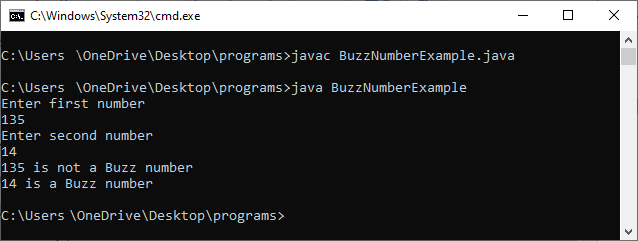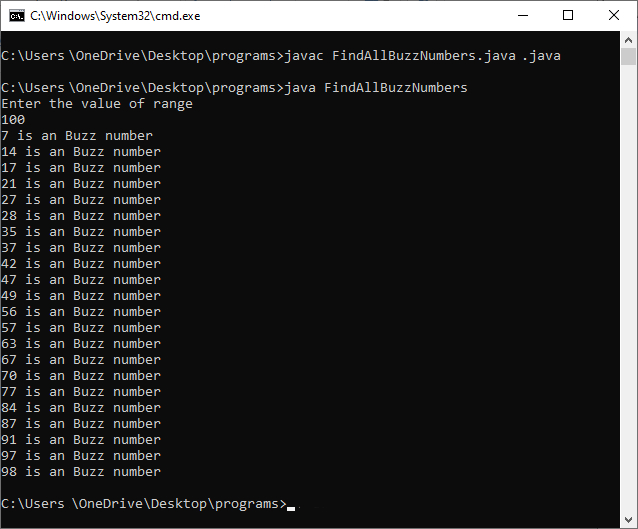In the realm of Java, there exists a distinct type of number known as a “Buzz number.” These numbers possess the characteristic of either ending with the digit 7 or being divisible by 7. While Buzz numbers may not receive as much attention as Prime or Armstrong numbers, they can still be encountered in interviews and programming discussions.
In simpler terms, a number can be classified as a Buzz number if it satisfies either of the following conditions: it ends with the digit 7, or it is divisible by 7.
Let’s consider a few examples of Buzz numbers.
- The number 42 is a Buzz number since it is divisible by 7.
- Similarly, the number 107 is a Buzz number because it ends with the digit 7.
- The number 147 qualifies as a Buzz number because it satisfies both criteria: it ends with the digit 7 and is divisible by 7.
- On the other hand, the number 134 is not a Buzz number since it does not meet either condition. It neither ends with the digit 7 nor is divisible by 7.
To determine if a given number is a Buzz number, we can follow the following steps:
- Obtain the input number.
- Extract the last digit of the number and check if it is equal to 7. If it is, then we can conclude that “the number is a Buzz number.”
- Calculate the remainder of the number when divided by 7. If the remainder is equal to 0, we can conclude that “the number is a Buzz number.”
- If none of the above conditions are met, we can conclude that “the number is not a Buzz number.”
BuzzNumberExample.java
//import required classes and packages
import Java.util.*;
import java.io.*;
import java.util.Scanner;
//create BuzzNumberExample class to check whether the given number is Buzz number or not
class BuzzNumberExample {
// create checkNumber() method that returns true when it founds number Buzz
static boolean checkNumber(int number)
{
// check whether the number ends with 7, is divisible by 7 or not
if(number % 10 == 7 || number % 7 == 0)
return true; //returns true when the number is Buzz
else
return false; //returns flase when the number is not Buzz
}
// main() method start
public static void main(String args[])
{
int n1, n2;
//create scanner class object to get input from user
Scanner sc=new Scanner(System.in);
//show custom message
System.out.println("Enter first number");
//store user entered value into variable n1
n1 = sc.nextInt();
//show custom message
System.out.println("Enter second number");
//store user entered value into variable n2
n2 = sc.nextInt();
if (checkNumber(n1))
System.out.println(n1 + " is a Buzz number");
else
System.out.println(n1 + " is not a Buzz number");
if (checkNumber(n2))
System.out.println(n2 + " is a Buzz number");
else
System.out.println(n2 + " is not a Buzz number");
}
}

FindAllBuzzNumbers.java
import java.util.*;
import java.io.*;
import java.util.Scanner;
//create FindAllBuzzNumber class to get all the Buzz number in a given range
class FindAllBuzzNumbers
{
//main() method start
public static void main(String args[])
{
int range;
//create scanner class object
Scanner sc=new Scanner(System.in);
//show custom message
System.out.println("Enter the value of range");
//store user entered value into variable range
range = sc.nextInt();
for(int i = 1; i <= range; i++)
checkNumber(i);
}
// create checkNumber() method to check Buzz number
static void checkNumber(int number)
{
// check whether the number ends with 7, is divisible by 7 or not
if(number % 10 == 7 || number % 7 == 0)
System.out.println(number + " is an Buzz number");
}
}
Output

Ensure regular visits to tutorials.freshersnow.com to expand your knowledge on subjects such as Buzz Number in Java.
